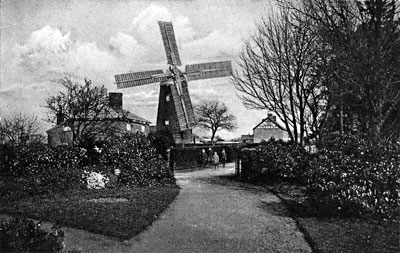
|
Harleston
Jay's Green towermill |
 |
|
c.1905
|
|
Harleston towermill stood on the corner of Candlers Lane, Jay's Green, Harleston. The five storey mill had 3 pairs of French burr stones that were powered by 4 double shuttered patent sails, each with 8 bays of 3 shutters and 1 bay of 4 shutters. The boat shaped cap held an 8 bladed fan. A portable steam engine was supplying auxiliary power to the mill in 1861. |
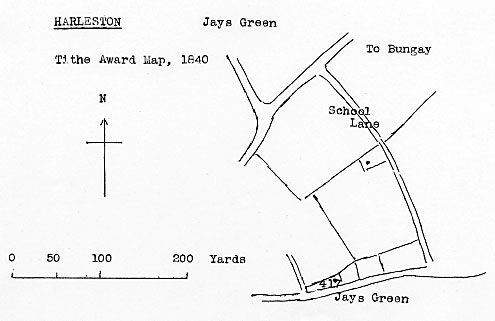 |
Tithe map 1840 - as redrawn by Harry Apling |
Tithe Award 1840 |
||||
No. 417 |
House, Mill & land |
Pasture |
0a. 1r. 11p. |
Pt. of 8/- |
|
William Barber was born in 1779 and died in 1851. His son, Samuel Barber, born in 1811 was also miller in 1839, before moving to Scole_towermill from 1845-1864. |
. . . consumption, Mr. E. D. Coote, miller, of Harleston, in his 42nd year. Debenham - On the 8th instant, East Dereham, very suddenly, in the year of her age, Elizabeth, relict of Mr. Thomas Debenham, late of Harleston, in this county. Edwards - On Tuesday last. |
HARLESTON EXTENSIVE CORN ROBBERIES |
At the Stradbroke Petty Sessions on Friday last..... Bale Knights, miller, Harleston, George Roberts, Harleston and Charles Meen, shoemaker Weybread appeared to answer a charge of having stolen six coombs of wheat of an off farm at Fressingfield belonging to the Rev. Augustus Cooper. The case caused much interest in the locality because it was believed that two, at least, of the prisoners were members of a gang who for some time past, have been carrying on their depredations in a systematic manner and also from an impression which had gained ground that had it not been for the precipitate action of certain parties, many more of the gang would have been brought to justice...... On the 29th of November last, the prisoner Knights waited upon Mr T. L. Hudson, merchant, and informed him that a few days previously he had purchased seven bushels of wheat of a man named Roberts, and that the sacks in which the corn was delivered bore upon them Mr Hudson's name in full. Knights also added that Robert's had requested the loan of his horse and cart. Mr Hudson who was aware of the systematic robberies that were being carried on in the neighbourhood, thought that an opportunity now presented itself for detecting some of the offenders, and he accordingly set for police constable George...stationed at Harleston.....They consulted together .... and eventually it was arranged that Knights should pretend to 'row in' with the parties, and – if necessary for the purpose of allaying suspicion – should accompany Roberts on any robbery for which the plans had been arranged. Accordingly when Roberts again requested Knights to lend him his horse and cart, Knights consented to do so and also to drive him some distance on the road. About two o'clock in the morning of the 4 th De, knights and Roberts started with the horse and cart from Knight's mill, Knights driving and Roberts lying covered up at the bottom of the cart. They took the road in the direction of Hairdressing, passed Shotford Bridge and when they reached the four cross-ways, Knights alighted from the cart, whilst Roberts took the reins and drove up the lane which leads to the Rev Cooper's premises. Roberts was absent about half an hour, and when he returned, Knights... saw that he had six coombs of wheat on the cart. Knights... then drove back to Harleston, leaving Roberts on the road. Roberts came up again as they approached the town and... went by another way to Knight's mill. When Knights arrived, Roberts assisted him to unload the wheat which was mixed up with other wheat... rendering it difficult to be identified. On this point... statements are very conflicting, Knights asserting he mixed the corn at Robert's request and in his presence... to allay Robert's suspicion; Roberts declares that Knight's mixed the corn whilst he had left the mill for... some rum. Knights also ascertained that a robbery was planned to take place the following night at... Mr Chapman of Fressingfield and this information, together with what had already transpired he imparted to Mr Hudson and police-constable George... Mr Hudson thought that by surrounding Mr Chapman's premises on the following night, a large number of the gang might be captured....and that several police officers should be stationed on Mr Chapman's premises... In the meantime... the morning following the robbery at Mr Cooper's farm, Mr Cooper's bailiff noticed some grains of wheat scattered about....and he discovered a quantity of wheat had been removed... He immediately proceeded to inform his master... and Mr Hudson detailed to Mr Cooper all the circumstances, telling him Mr Knights was acting under the direction of the police and … that the present case was not... clear against Roberts. He... requested that Mr Cooper not take any action … that on the following night there would be an opportunity of capturing many more of the gang. Mr Cooper, however, and police-constable Vincent, of the Suffolk force, proceeded to the residence of Rev. Mr. Colbeck, a magistrate, residing at Fressingfield and obtained warrants... against Roberts... also against Knights, not withstanding what Mr Hudson had said about Knights acting under the direction of the police. Knights and Roberts were apprehended... from statements made by Robert's wife, Meen was also taken into custody. A warrant was also issued for .... Dunn, but Dunn absconded. It... does seem... poor encouragement that a person doing his utmost to assist in the detection and apprehension of a gang of thieves... should be taken into custody and committed for trial as equally guilty... Police-constable Vincent stated.... he had not communicated with any member of the Norfolk police and could not... have any knowledge of their plans but it cam out that Vincent had called at (police-constable) George's house and had been informed by Mrs. George that her husband knew all about the matter... One would have supposed that...Vincent would have at least endeavoured to see George before he took any decided steps, but there is nothing to show that he attempted to do so. The magistrates, nevertheless... exonerated Vincent from all blame.... ...our reporter, who was present at the last hearing only applied for permission to copy the depositions... taken at the first hearing... he stated that it was customary for such permission to be granted, but Mr Lawton, of Eye, the clerk to the justices... stated that during the more than twenty years he had been the magistrates clerk he had never had such an application before.... Mr. Lawton was asked if he could not decide at once, but he replied he must takes some time to think about it, and requested our reporter to leave his address... as no communication... has been received... it is to be presumed that the clerk... declined. What motive Mr Lawton can have... it is difficult to conceive as the circumstances of the case are well known in the locality. We have however, from another source obtained the evidence of the witnesses who were examined in the first hearing and these we now append. Mr Robert Reeder, farm bailiff to the Rev Augustus Cooper, stated that on the morning oft the 3 rd of December ash e was passing out of his master's yard, he noticed some wheat which was spilled near the gate. He went immediately to the barn but as everything appeared all right there, he proceeded to the granary and found some wheat had been taken from a heap. He directly informed Mr cooper, and saw Mr Hudson at that gentleman's residence. He afterwards went to Knight's mill and saw several parcels of wheat, one sample of which he believed to be taken from his master's, It was old wheat. In cross examination Mr Reeder said that when he saw Mr Hudson at Mr Cooper's, Mr Hudson told him that corn had been lost in the neighbourhood and a trap had been laid for the thieves; and Mr Hudson asked Mr Cooper to keep the matter quiet for a few days as he had no doubt the police would find out the parties. Mr Hudson also told Cooper that Knights was acting under the direction of the police and it would be extremely hard if Knights was to be dealt with as a criminal as he was to receive the corn in order that the thieves were to be detected. ...witness said that the sample taken from knights mill was like his master's but he would not swear to it. John Vincent, police-constable at Fressingfield stated that having received information that five or six coombs of wheat had been stolen from Mr Cooper's he proceeded thither. In the yard he observed marks of wheels and these marks he traced in the direction of Harleston. He then went to Knight's mill, where he saw a cart, which he believed was the one he traced as the tire of the wheel was square and quite sharp. He saw Knight who told him he had purchased six coombs of wheat of Roberts... it was in the mill... mixed with other wheat. Knights also told him that he had been with Roberts to the four cross ways; that Roberts took the horse and cart, ad turned down a a lane; that Roberts was gone about half an hour and then came back with six coombs of wheat which he (Knights) took home and mixed. Knights also told him that he had given Roberts £ 6 for the wheat as Roberts had stated that a party was in the town who wanted the money; and that Knights added moreover, that what he had done was by direction of Mr Hudson and Police-constable George. On the following day he (Vincent) apprehended Roberts at Harleston, and told him he was accused of stealing wheat....Police-constable George said to witness “ you had better not interfere with the case as I know all about it ” Vincent here produced a sample of wheat which was taken from Knight's mill. Witness then took Roberts before the rev Mr Colbeck and Roberts admitted that he and Knights went after the wheat and that he (Roberts) took the wheat and carried it back to Knights. Roberts was then left with Sergeant Mayes at the Stradbroke station. When Knights was before Mr Colbeck, he was about to make a statement, when Police-constable George stopped him. In cross examination, Vincent said that Knights had told him that he was acting under the direction of Mr Hudson and Police-constable George to which he (Vincent) replied “ I have nothing to do with their plans as I have not been communicated with ” He arrested Roberts before he saw George. George told him he expected a robbery was to be committed and that Knights was to “ row in ” wit the parties. Mrs George had previously told him that her husband knew all about the matter. George Mayes, a police-sergeant at Stradbroke, said that Roberts was brought to the4 station on Wednesday the 5 th..When he was being locked up he said “ I don ’ t know why I should be locked up any more than Knights. I consider him worse than me he called me up between one and two in the morning and I got up and went with him to Weybread. Knights... told me to go with the cart down the lane I don ’ t know where the corn came from ” Robert's wife... came to the station and said he received the corn from Knights; and then remarked to Roberts “ You know Meen and Dunn were there ” Benjamin Green, landlord of the “ Duke William ” public house deposed that Roberts,Meen and Dunn were drinking there in company and that they had some beefsteaks there. This concluded the evidence given at the first hearing of the case. On Friday last the following witnesses were examined:- Harriet Rodwell deposed – I live at Redenhall and am servant to Mr King, landlord of the “ Yew Tree ” ... On Tuesday evening, the 4 th December, I saw meek and ...Dunn...sitting in the kitchen drinking... Meen had a sovereign and I heard him say “ I have been looking at the dear little farmers when they were lying on their pillows ” . Meen then asked Dunn to lend him a shilling and Dun replied “ Yes, a sovereign if you like ” Dunn then laid a sovereign on the table... laid his finger on it and said “ you have not got it yet ” I saw that each of them had a sovereign in their possession. Dunn then put the sovereign into his pocket and said “ I am not without a sovereign or a shilling ” and Meen then took out a sovereign and showed it to Dunn after which he put it in his pocket again... George Barber stated - I live at Wingfield and work for Mr Buck. On the afternoon of the Monday before the robbery I met two men - Dun and another whom I did not know... going from the direction of Harleston towards Weybread. Between five and six o'clock I saw (them)... return towards Harleston and I said “ good night ” ... I saw them in Mr Bond's first field... I will swear that Dunn was one but I cannot say that any one of the prisoners was the other man. Police-sergeant Mayes said - I apprehended Meen on the Saturday after the robbery... I have not been able to take (Dunn) into custody as he has absconded. Meen was at home when I apprehended him... I have made enquiries at Harleston and other places with respect to Dunn, but have not been able to ascertain his whereabouts. Police-constable Vincent... wished to make an addition to the evidence … at the first hearing of the case... Since then he recollected that Knights said he had bought seven cooms of wheat of Roberts before... and told Mr Hudson. Mr Fox to Vincent - Do you mean to tell this court that you did not recollect this at first hearing! - I did not... Mr Fox - How is it then that you recollect it after a lapse of eight days from the first hearing? This concluded the evidence Mr Fox... on behalf of Knights said... he had not expected to find his client placed in the position he now was, for he had heard the whole circumstances... and had seem Mr Hudson and police-constable George, and he knew that unless these two had committed perjury the charge of felony could not be proved against Knights... Roberts could not be convicted of this unless Roberts himself made a confession. In his opinion police-constable Vincent had acted with great precipitancy and indiscretion... had Vincent acted in a different manner there would have been... a considerable gang of thieves before the magistrates, and that Knights, instead of being charged with an offence, would have been a witness in the case. Let the magistrates look at all the circumstances. Mr Reeder... discovered the loss of some wheat... his master was informed... a police-constable was sent for... It was to be feared that there was a jealousy existing between the police forces of Norfolk and Suffolk and that Vincent... having found a robbery in Suffolk had been discovered by the Norfolk police, was urged to... apprehend the prisoners without consulting police-constable George. If... he (George) and Vincent had laid their heads together... a large body of men would have stood in that room as prisoners... there would have been no difficulty in convicting the lot... the public thought so to... look at what Vincent said in his evidence... first … he had said he did not remember a certain statement made by Knights, as to his having purchased wheat of Roberts on a previous occasion, but now he said he remembered Knights saying he had bought seven coombs of wheat before... what Vincent referred to was the seven bushels - not coombs - which Knights had told Mr Hudson he had purchased of Roberts... Before a man could be convicted of felony it is absolutely necessary that the goods which he was charged with stealing should be proved to have been taken... with the design of converting them to the takers own use... After knights purchased the seven bushels of wheat he told Mr Hudson of the transaction, that police-constable George was consulted, and that what Knights had done, had been entirely by the advice of Mr Hudson and George... was it possible Knights was to be treated as a criminal? If he was to be so treated, he (Mr Fox) should certainly recommend a man to tell a policeman nothing at all, and if Knights was convicted, then most certainly Mr Hudson and police-constable George ought... to be indicted too. It might be said - Why did Knights pay Roberts for the corn... to allay suspicion... that Roberts did not suspect Knights might be inferred from the fact that he informed Knights a robbery was arranged to take place at Mr Chapman's Mr Mosley here remarked that Mr fox was not engaged to prosecute Roberts. Mr Fox said he had not intention of doing so... the plan which had been laid was entirely successful... police-constable Vincent stepped in and spoiled the lot... His client had not been in Harleston many years, but during the time that he had been there he had conducted himself in every way as a respectable and straightforward man should do. Reams more of this but essentially Meens says he knows nothing and is of no involvement at all, Roberts and his counsel are trying to muddy the water by saying that Knights told Roberts what to do not vice versa, Hudson confirmed that Knights came to him to say he had his suspicions and that whilst he (Hudson) had not noticed wheat going missing the bags and wheat produced by Knights matched his property, he (Hudson) had noticed barley going missing and that locks had been tampered with. Both Hudson and PC George re-iterated their involvement and awareness off all Knights had done under their approval to enable the apprehension of the thieves, that although they thought the next robbery would be in Norfolk, Vincent had been made aware of the goings on and had to their minds 'jumped the gun'. Rev. Cooper however back Vincent to the hilt, said Fox was being unfair in claiming Vincent had jumped the gun, and had acted in the best way - on poking the other magistrates all agreed. |
HARLESTON |
At the Suffolk Quarter sessions held last week at Ipswich, bale Knights and George Roberts were indicted for stealing wheat from the Rev A Cooper art Fressingfield. From the report which we gave of the proceedings before the magistrates at the time of committal, our readers must have been surprized that Knights - whose sole object had evidently been to assist in the discovery of a gang of thieves who were carrying on extensive depredations in the neighborhood - should have been included in the charge. No doubt the Chairman of Quarter sessions, C Austin Esq, also felt that his brother magistrates, in committing Knights, certainly 'committed' themselves. In referring to the case, in his charge to the Grand Jury he said that “it was marked by some singularity in circumstances. Knights was a miller at Harleston, Roberts appears to have stole the wheat and carried it to Knight's mill and the latter was charged as receiver. It would appear that Knights had concerted with one or more of the Norfolk Policeman, to assist in discovering the robbery, and for that purpose he was to pretend that he was an accomplice and the corn was taken to his mill. It was there mixed with some other corn and being of a peculiar quality was easily identifiable by the Suffolk Police, who had no knowledge of this arrangement between the Norfolk police and knights and who accordingly took Knights before the magistrates and knights was committed as a receiver of the corn. If they believed in the existence of such a compact they could not of course find a true bill against Knights. The occurrences in this case had a sort of romantic appearance about them, and the case had an exact parrallel in one which was recorded in law books, where a case was recorded of a man's agreeing to assist in committing a robbery for the sake of the reward. There did not appear to have been any such motive in Mr Knight's share in this transaction, and they could not of course find a true bill against him if they saw any truth in these statements. |
HARLESTON |
J. Caley Respectfully announces the undermentioned SALES by AUCTION during the next month |
HARLESTON |
Local Bankrupts (from the London Gazette) |
The Bankruptcy Act 1861 |
To be let |
Situations Vacant |
Situations Vacant |
Adjusting Lot g, 1b. Windmill, JAYS GREEN With spacious Brick, Stone, and Tiled house in the occupation of Mr. Thompson Hudson. Lot Range of Four Boarded and Tiled COTTAGE fronting the Jay's Green Lane. |
Robert Myhill, who was born in August 1861, was recorded as aged 16 in the 1881 census and he emigrated to Canada in 1888. |
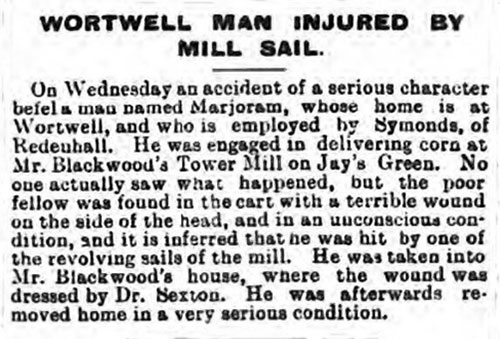 |
Norwich Mercury - 8th November 1902 |
On 5th January 1974, Gordon F. Williams wrote to Harry Apling to say his maternal grandfather, William Blackwood had worked Jay's Green mill from about 1870 until it was taken down in 1916. |
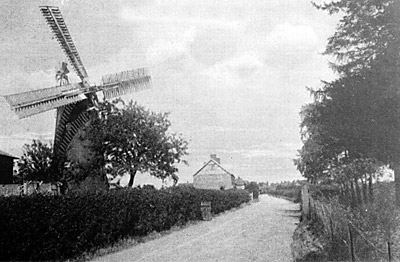 |
c.1915 |
 |
Lease taken out on 25th March 1911 between W. Hazard and S. Gardiner & W. Brock |
William Barber b.1779, my GGG Grandfather was miller at Jay's Green Tower Mill between 1830s - 1851. His son Samuel Barber b.1811 was also at Jay's Green in 1839, then in 1845 - 1864 he was Miller at Scole_towermill. His son William Samuel Barber b.1837 was Miller at the following: 1861 - Eye, 1871 - Gissing, 1881 - Rockland All Saints, 1891 - Hingham_Mill_Corner_towermill and between 1878 -1879 William appears to have been at Carlton_Rode_towermill. William was at Hingham_Mill_Corner_towermill until 1904, his Step-Son Robert John Watling was recorded as miller up to 1908. |
Robert John Watling moved from Hingham_Mill_Corner_towermill to Cringleford_watermill, where he remained until it burnt down in 1916. He was also listed at Saxlingham Thorpe in 1922 and 1925. |
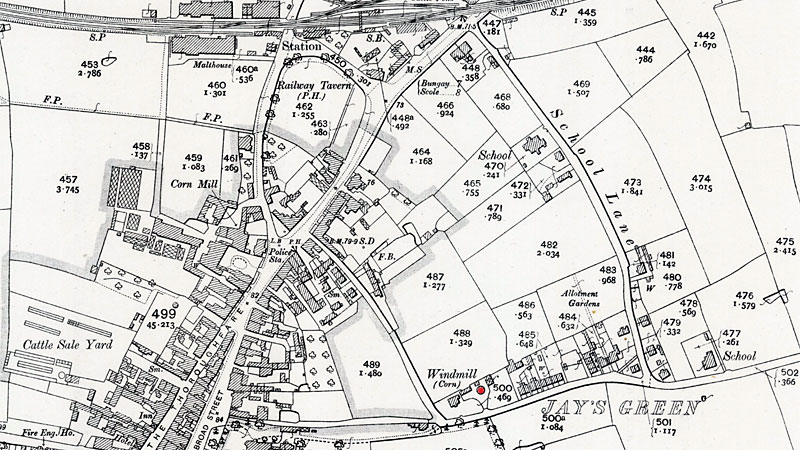 |
|
O. S. Map 1903 Courtesy of NLS map images |
The 1851 census records several mill workers and retired millers living in the parish: Visiting Robert Rayner, a carpenter of London Road, employing 2 men: |
Unallocated Harleston millers: |
|
Pigot's 1830: William Barber, miller
White's 1845: William Barber, corn miller 1851: William Barber died (b.1779) Index of Wills 1851: William Barber
White's 1854: Edward D. Coote, corn miller Tuesday 8th May 1855: Edward D. Coote died of consumption aged 42 1858: Bale Knights, miller May 1861: Mill advertised for sale by auction 1861: Bale Knights, miller 1861: Portable steam engine being used for auxiliary power July 1861: Mill advertised for sale by auction
April 1862: Bale Knights, bankrupt and in Norwich gaol 1862: Bale Knights, miller - lease expired at Michaelmas 1864: Henry Lombard Hudson, miller September 1866: Mill advertised to be let 1868: Henry Lombard Hudson, miller - brick in Mill House inscribed H. L. H. 1868
1875: Henry Lombard Hudson, miller
White's 1883: Henry Lombard Hudson, corn & coal merchant, miller, maltster & farmer
c.1895: Henry Hudson left the mill and bought Harleston steam mill and maltings |
If you have any memories, anecdotes or photos please let us know and we may be able to use them to update the site. By all means telephone 07836 675369 or
|
| Nat Grid Ref TM24858345 |
Copyright © Jonathan Neville 2004 |